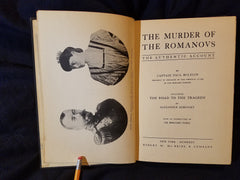Book of Khalid by Ameen Rihani. Illustrated by Khalil Gibran. First printing.
The Book of Khalid by Ameen Rihani. Illustrated by Khalil Gibran. Dodd, Mead and Company. 1911. First printing. "Published October, 1911" stated with no statement of later printings on the copyright page. 5.25" x 7.5" viii, 349 pages Hardcover with no dust jacket. Moderate cover edge wear with some bumping on cover tips. There is some discoloration from the top tip of the front cover, suggesting that there may have been some moisture. It seems to have minimal impact on any pages inside. There is also a slight one half inch in diameter stain on the top of the back cover. There is an erasure mark on the first blank page. There are a couple of paragraphs bracketed in a thin black ink in the'Al-Fatihah' chapter. I did find some similar marking in light pencil in the interior of the book, which I missed on first examination. No tears, folds or creases to pages. Binding is tight with no looseness to pages. Not ex-library, not remaindered and not a facsimile reprint. For sale by Jon Wobber, bookseller since 1978. FB29a
"The Book of Khalid (1911) is a novel by Arab-American writer Ameen Rihani. Composed during a sojourn in the mountains of Lebanon, it is considered to be the first novel by an Arab-American writer in English. His contemporary, Khalil Gibran, illustrated the work, and the story is often seen as an influence on Gibran's own well-known book The Prophet.
The central theme of the novel is the attempt to reconcile the culture and values of "the West" and "the East," a universal concern in Rihani's work, and, indeed, entire approach to life. Khalid ruminates constantly on the merits and future destiny of America, which he connects to the Arab world in their own struggles with the Ottoman empire and with religious intolerance and conflict. Like Rihani himself, who synthesized two distinct cultures perhaps more than almost any other writer of the time, Khalid, having experienced America (and considered its strength and weaknesses) during his stay of several years, returns and develops a philosophy that engages the Arab public directly. He is continually frustrated with America's materialism and inconsistent pursuit of its stated ideals, but he still believes that America represents a powerful force in the world's future evolution and that the Arab world can learn from its political ideals, relative respect for religion, and embrace of science and progress. Although these expressions result in his own persecution, he emerges as a modern prophet with a combined political, cultural, and spiritual message. " - wikipedia
















